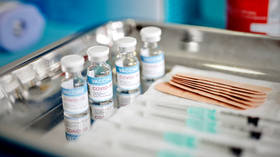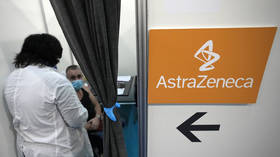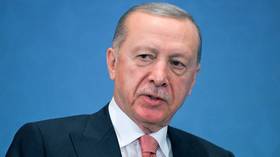Israel finds 4 Covid vaccine jabs ‘not good enough’ against Omicron

A fourth dose of coronavirus vaccine showed dwindling effectiveness against the Omicron variant, according to a trial conducted in Israel, with one its lead researchers saying the immunization is simply “not good enough.”
A study involving 154 medical staffers at Sheba Medical Center near Tel Aviv found that a fourth shot of the Pfizer vaccine gave only marginal protection against the Omicron strain compared to previous mutations. A separate group of 120 volunteers were also given a fourth dose of Moderna's inoculation following three rounds with Pfizer, but their immune response was similar.
“We see an increase in antibodies, higher than after the third dose. However, we see many infected with Omicron who received the fourth dose,” said Gili Regev-Yochay, one of the head researchers on the trial, adding that while “the vaccine is excellent against the Alpha and Delta [variants],” for Omicron “it’s not good enough.”
Despite the new findings, Israeli health officials already moved ahead with fourth doses for the elderly, the immunocompromised and medical workers beginning earlier this month, with some 500,000 receiving a second booster on top of an initial two-dose regimen as of Sunday.
Though the trial is still in an early phase and the hospital did not offer specific figures, Regev-Yochay said she made its preliminary conclusions public as boosters are a matter of “high public interest,” according to the Times of Israel. She noted that giving fourth doses to high-risk residents is “probably” still the best approach, but suggested the booster campaign should be limited to an even older age group than the current over-60 guideline.
Both the World Health Organization and the EU’s drug regulator, the European Medicines Agency, have cautioned against the over-use of boosters, though for different reasons. The WHO has called for a more even distribution of vaccine doses around the world, observing that some nations are moving ahead with third and fourth shots before many in poorer countries receive their first. The EMA, meanwhile, pointed to potential adverse effects of booster shots last week, warning that repeated vaccinations in a short period of time could result in “problems with immune response.”
One of the most vaccinated countries in the world, Israel was the first to roll out fourth vaccine doses as it saw a significant spike in coronavirus infections linked to the Omicron strain. Deaths and hospitalizations have only seen a slight uptick in recent months, however, in line with findings suggesting the latest ‘variant of concern’ produces milder symptoms than previous mutations. Despite the misgivings of world health bodies, Chile, Denmark and Hungary have since followed suit in administering fourth shots, while officials in Austria have recommended them on an “off-label” basis for healthcare personnel.














